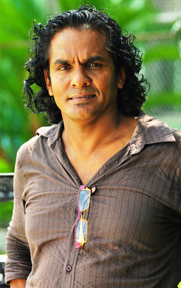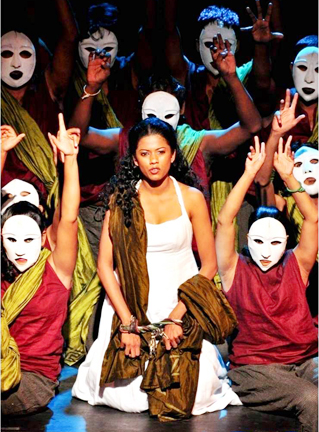|
DRAMA REVIEW
Antigone
carries her message across antiquity
A review of Ada Vage Dawasaka Antigone:
by Dilshan Boange
 On the 2nd April 2016, I sat under the gentle darkness of the Lionel
Wendt and watched Priyankara Rathnayake's Ada Vage Dawasaka Antigone
come alive on the boards as a Sinhala translation of the classic Greek
play Antigone by Sophocles. Set in the ancient Greek state of Thebes the
story shown how in the aftermath of the Theban civil war how loyalty,
treason, and humanity get thrust in a moral conflict between state power
against individual honour and integrity. On the 2nd April 2016, I sat under the gentle darkness of the Lionel
Wendt and watched Priyankara Rathnayake's Ada Vage Dawasaka Antigone
come alive on the boards as a Sinhala translation of the classic Greek
play Antigone by Sophocles. Set in the ancient Greek state of Thebes the
story shown how in the aftermath of the Theban civil war how loyalty,
treason, and humanity get thrust in a moral conflict between state power
against individual honour and integrity.
Death
One of the central conflicts that this play deals with is how
'heroes' and 'traitors' are to be treated in death. Two brothers who
fought in opposing sides in Thebe's civil war are killed in the
battlefield. The one who fought on the side of King Creon, whose troops
were victorious, is honoured with a hero's funeral while the other is
declared a traitor and deemed unfit to receive even burial and whose
body is ordered to be left out in the open field to become carrion. The
sister of these two fallen solders - Antigone violates King Creon's
royal decree, and under the cover of night buries her brother who was
declared a traitor, ardently upholding her fraternal love for her
brother's dignity, stating that he too like any other human deserved to
be buried. What follows are conflicts of laws against morals, familial
bonds against functions of state, conscience against pride, and
relooking at what keeps together social order in a state - humanist
mercy or unbending will, on the part of the ruler.
Discourse
One of the significances that this play would have in the broader
public discourse of present is, how this story and its facets of
conflict may connect with debates and discourses on peace and
reconciliation in our country following the near 30 year separatist war
in the North. Should traitors be memorialised and commemorated even by
their loved ones? Antigone evokes that question within its folds of
thematic investigation of relations between individuals, society and the
state.
 The
text of the play reflected from a point of lingual status as one that
resonates not a modern day Sinhala play, where colloquy would have to
mark its presence in some way to signpost contemporary Sri Lankan
vernacular, but a story of antiquity and thereby calling for a dialect
marked with literariness through stylistic expression and grammar of
olden times. This factor is seen clearly in Sinhala classical drama
which must through its very 'lingual acoustic' distinguish itself from a
contemporary plays. The
text of the play reflected from a point of lingual status as one that
resonates not a modern day Sinhala play, where colloquy would have to
mark its presence in some way to signpost contemporary Sri Lankan
vernacular, but a story of antiquity and thereby calling for a dialect
marked with literariness through stylistic expression and grammar of
olden times. This factor is seen clearly in Sinhala classical drama
which must through its very 'lingual acoustic' distinguish itself from a
contemporary plays.
Picasso
A notable feature of this play is how the 'stage set' has as a
'backdrop' Pablo 'famous painting 'Guernica' in three 'panels'. 'Guernica'
depicts the horrors of war and possibly carries the subtext of
'fratricidal war' since the painting is an artistic expression of the
incident known as 'the bombing of Guernica' which is when at the behest
of the Spanish government, a village named Guernica in the Basque region
of Spain came under aerial bombardment bombed by German and Italian
forces on the 26th of April 1937. The Basque region of Spain is known
for harbouring a separatist struggle that involves armed conflict
against the Spanish government led by the organisation known as ETA or
Euskadi ta Askatasuna, which means 'Basque Fatherland and Liberty'.
Backdrop
Therefore, when Rathnayaka adopted Picasso's 'Guernica' as a visual
backdrop element one may surmise that it possibly to add to the subtext
of the play, via set design, the themes of 'fratricidal war' and
'treachery'. Practically every civil war is more or less a fratricidal
war since it's the citizenry of one country that wars against each
other. Further in Antigone the crux of the story stems from the fact
that the honoured hero and the dishonoured traitor are bothers who
killed each other due to being in opposing sides of a civil war. The
latter theme of 'treachery' can be construed through what the painting
stands for since the Spanish government of 1937 committed treachery upon
their own civilians by 'commissioning foreign forces' to attack them.
The theme of treachery in Antigone can be identified from how Antigone
is guilty of disobeying a royal decree and thereby becomes a disloyal to
the will of the ruler. It is in the eyes of the state an act of treason.
The acting was overall good and special mention must be made of the
performances of Dinidu Dodangthenna who played his role of the messenger
guard/soldier remarkably well and also applause are due to Gihan
Fernando who as the Theban king Creon projected a regal presence that
was commanding and all pervasive.
Portrayal
Costumes were commendable although Rathnayaka's Ada Vage Dawasaka
Antigone may certainly not be viewed as work that delivers an authentic
portrayal of ancient Greek attire but a creative rendition of tastefully
fusing dress motifs of olden times with certain types of attire today as
seen through the characters of King Creon and his son prince Haemon.
With choral song and stylised dance delivered by an ensemble of able
players Rathnayaka's Ada Vage Dawasaka Antigone which adapted to the
stage from the script originally translated to Sinhala by Ariyawansa
Ranaweera, proves to be a play which shows worthy mettle as a work of
theatre with appreciable 'creative investment' made to bring a classic
Greek tragedy to a Sinhala audience without losing its identity as a
tale from times olden of a land greatly distant to us by both time and
geography. |

